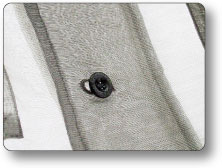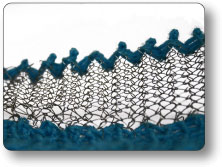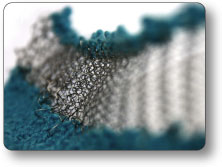The Shape Memory Alloys are characterized by their extraordinary ability to recover any shape pre-programmed, upon heating until reaching their Martensite-Austenite transformation temperature. Nitinol, in particular, is the name of a light weight alloy having a content of Titanium of 45% and, until today, it has been used in advanced sectors like aerospace and, recently, in medical applications. Biocompatibility of Ni-Ti alloys depends on the intrinsic strength of Ni intermetallic bond, that avoids the presence of its particles on the external surface of the wire, and on the inertness of superficial TiO2.
Through the Technology Transfer Programme of the ESA, Grado Zero Espace has transferred this knowledge in traditional sectors, like, in this case, for textile applications. In this framework, Grado Zero Espace has used Shape Memory Alloys to obtain a fabric used for the manufacturing of a shirt with long sleeves. The sleeves could be programmed to shorten immediately as the room temperature heats up. The shirt can be screwed up, pleated and creased, then, just by a flux of hot air (even a hairdryer), it can pop back automatically to its former shape. Later, the name "Oricalco" was associated to the fabric Oricalco obtained by Grado Zero Espace and used to manufacture the first shape memory shirt. The fabric "Oricalco" is available for Universities and research labs in the store.
Besides, after Oricalco development, Grado Zero Espace continued its study on Shape Memory Materials and on other type of Ni-Ti Alloys accumulating a lot of experience in manufacturing different type of Smart Textile Structure (fabrics, knits, tubular, special yarn, hybrid yarn,...), and permitting, in some cases, to optimize the manufacturing processes also for serial production. Grado Zero Espace, in fact, had an important role within the Loose&Tight project, which aimed at developing a novel concept of elastic graduated compression hosiery based on the exploitation of the superelasticity of Nickel-Titanium based alloys integrated as thin wires in a properly designed textile structure. At present time, Grado Zero Espace is dealing with the development of a textile product (more in the specific an ortopaedic support) within the Avalon project, which has the principle objective to develop novel hybrid textile structures integrating multifunctional Shape Memory Alloys (SMAs) and the related processing techniques as well as design, simulation and organizational methodologies.


